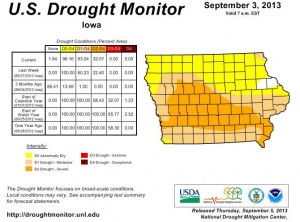CLICK HERE for the latest market quotes from the Iowa Agribusiness Network!
CLICK HERE for the latest market quotes from the Brownfield Ag News Network!
CLICK HERE for the latest market quotes from the Iowa Agribusiness Network!
CLICK HERE for the latest market quotes from the Brownfield Ag News Network!
The Carstens Farmstead in Pottawattamie County is the site for a family fun weekend as the 1880 Farmstead Days are here. This is the 31st year for the Carstens Farmstead Days featuring horse, steam and gas power exhibits. Over two hundred restored antique tractors will be on hand. Terry Torneten, member of the 1880 Carstens Committee, says the event starts out with the most important meal of the day.
He says “The activities start right on Saturday morning with a breakfast by the Shelby Fire Department. The thresher breakfast will starting at 6:30 in the morning.” The breakfast will be held on both Saturday and Sunday. Saturday night is highlighted by the Staley’s chicken supper at 5:30pm with proceeds going towards the maintenance of the farm. This year the Carstens days plans to feature Case IH tractors. Torneton says “We have the Heartland JI Case collectors club looking to invite people to bring their tractors to display. They want to make sure this is the biggest turnout of Case IH tractors ever at Carstens.”
As far as entertainment, Carstens has invited Cloggers to perform at 12:30pm on Saturday, Country Kickers America performs on Sunday at 12:30 and a few local bands will play a variety of music during the entire celebration. The 2013 Carstens 1880 Farmstead Days will also have a quilt show, crafts galore and several vendors selling antiques. Admission is $5 per day for everyone nine years or older. The Carstens farm is located off I-80 exit 34 south of Shelby where signs will be posted.
(Joel McCall/KNOD)
About one-third of Iowa is now in a severe drought and the increasingly dry conditions raise the risk for grass fires. State Fire Marshal Ray Reynolds says rural residents who burn ditches or large piles of debris need to be especially careful. “I think people underestimate just how dry the conditions are,” Reynolds says. “The other thing we see, as we start to get into the fields in the next month or so, equipment and machinery are another common cause of fires.”
Prairie or grass fires are also often ignited by discarded cigarettes.”We see an awful lot of people who are throwing cigarettes out of their cars and I’ve not seen a car yet that doesn’t come with an ashtray. We would just encourage people who are traveling through our state to put their cigarettes out in their vehicle in the ashtray,” Reynolds says. A simple spark, combined with the recent low humidity and a little wind, can quickly turn into a large fire.
Reynolds says every year, at least a few Iowans are burned or even killed in “controlled burns” that get out of control. “If we could just remind Iowans…if you absolutely have to burn, make sure you have a water source close by and just be cognizant of the conditions when you burn,” Reynolds says.
(Radio Iowa)
DES MOINES, Iowa (AP) – Drought conditions have worsened in a portion of the Midwest including Iowa, the nation’s leading corn producer, as the region experienced its hottest week of the year. The extreme heat and near record low August rainfall combined to expand drought conditions from the eastern Dakotas southeastward into western Illinois. Iowa saw its warmest week since July 2012, with highs topping 104 at Des Moines on Aug. 30.
The extreme heat and near record low August rainfall combined to expand drought conditions from the eastern Dakotas southeastward into western Illinois. Iowa saw its warmest week since July 2012, with highs topping 104 at Des Moines on Aug. 30.
About 98 percent of the state is in drought. Severe drought expanded to 32 percent of the state from 22 percent the week before. Conditions are mostly unchanged in Nebraska and Kansas. The weekly drought monitor, which tracks conditions from Aug. 27 through Tuesday morning, shows 61.7 percent of the contiguous United States in drought, nearly the same as the week before.
Cass County Wellness Coordinator Teddi Grindberg has announced the County has been awarded $11,554 in a USDA Rural Business Enterprise Grant (RBEG), to assist with Farmers Markets development throughout the County. The award will extend through the end of the current market season, the coming year, and the end of the next season.
The focus of the grant is to help communities within Cass County to create and/or expand area farmers markets. The Cass County Local Food Policy Council will work in conjunction with interested communities to identify current and potential vendors, establish community-based market committees, and to promote the purchase and consumption of the local food provided in the markets.
Atlantic Police Chief Steve Green says Wednesday evening’s action by the City Council pertaining to an amendment of an ordinance allowing bow hunting of deer within the City limits, means anyone interested in hunting this season, and did qualify to do so last season, should contact the Police Department to acquire a permit. Hunters who did not shoot qualifying scores last season may contact Lt. Dave Erickson at the P-D, to set-up a time to qualify.
Green says the department has the permit applications and hunting instruction packets available. Both may be picked up during normal business hours (8-a.m. to 4-p.m., Monday through Friday). In addition, land owners who would like to allow bow hunters to hunt on their land, should contact the Police Department at 712-243-3512 during business hours, to sign-up.
The Council’s action Wednesday, was an effort to entice hunters to actively assist in the reducing of an excessive number of deer that have plagued the City in recent years. Last year, over 30 hunters qualified for the right to hunt within the City limits of Atlantic, but only two deer were taken. The greatest change to the Ordinance, according to Green, is that hunters will be reimbursed for the cost of the State Deer Tag for taking their first doe within the City limits. Subsequent to taking an antlerless deer and having it verified that it was taken within the City limits, hunters will be given a permission slip allowing them to use their next “any sex” tag, to take one of the many large bucks that frequent the community.
Andrea Farrior and Chris Parks discuss the latest information from the Atlantic Animal Shelter.
Podcast: Play in new window | Download (3.2MB)
Subscribe: RSS
An Iowa State University professor has become a point person in the long-simmering debate over labeling of genetically-modified foods. Ruth MacDonald is chairwoman of I-S-U’s food science and human nutrition programs. “As a scientist, I am very concerned that we, as a society, don’t take a simple, knee-jerk reaction and say: ‘This is a bad technology. We must throw it out and we must fear it,'” she says. “I think that we need to have an open discussion about what these are and how they’re developed and what the real risk/benefits are.”
MacDonald was part of a panel discussion at an event in Ohio in mid-August, debating the safety of genetically-modified foods, and the next week she participated in an Iowa State University Extension “webinar” on the same topic. “When there’s no evidence from a scientific perspective that there’s human health concerns for these foods, I have a problem with the argument that, ‘Well, this is scary. We don’t know what it is, so we just must avoid it,'” MacDonald says.
American consumers and farm animals have been eating genetically-modified food for more than 20 years and MacDonald says “there is no evidence” G-M-Os present a health risk. “We need to be using science and every tool that we have to make sure that we can continue to have the kind of quality foods that we are used to and that we need to survive,” MacDonald says.
Two states have passed laws requiring G-M-O labeling of food, however, and bills have been introduced in another two dozen states that would require such labeling. Critics charge genetically-modified foods can lead to increased allergies or a resistance to antibiotics. MacDonald says it’s hard to determine the actual G-M-O content in food because most products contain a variety of ingredients and while one ingredient may be genetically-modified, only a trace winds up in the final product. MacDonald also finds it ironic that people embrace the latest technology in products like computers, but express fear about using the latest technology in their food.
(Radio Iowa)
DES MOINES, Iowa (AP) — Iowa’s corn crop has continued to decline as Iowa experienced the hottest week of the year last week. The U.S. Department of Agriculture’s weekly crop condition update released Tuesday says 25 percent of the state’s corn is poor or very poor. That’s up from 21 percent the week before. Just 39 percent is good or excellent down from 44 percent the week before and 48 percent two weeks ago.
Iowa’s soybeans are now 24 percent poor or very poor, up from 20 percent a week ago and 39 percent is good or excellent, down from 45 percent. The conditions generally reflect the national trends. Iowa temperatures averaged nearly 12 degrees above normal and average rainfall was about a third of an inch. Normal for the week is about an inch.